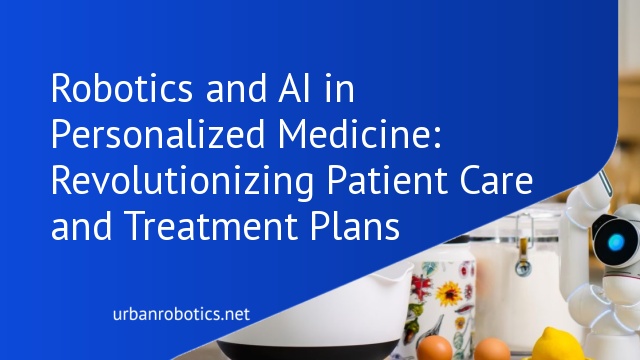The Role of Robotics and AI in Personalized Medicine
Robotics and AI are transforming personalized medicine. Robotic surgeons enhance precision during operations, minimizing human error. In 2022, Da Vinci surgical systems performed over 10 million procedures globally, reflecting their reliability.
AI algorithms analyze vast health data to offer tailored treatment plans. In oncology, for example, AI systems identify optimal cancer therapies by evaluating genetic markers. AI helps in diagnosing diseases at earlier stages, improving survival rates.
Wearables integrated with AI track patient health in real-time. Devices like Fitbit and Apple Watch monitor vitals, providing accurate data for personalized healthcare. These assist doctors in making informed decisions based on actual data trends.
Pharmacogenomics uses AI to predict individual responses to medications. This ensures effective drug prescriptions and reduces adverse effects. The integration of robotics and AI is setting a new standard in personalized medicine, optimizing patient care and outcomes significantly.
Advancements in Robotics for Personalized Medicine
Surgical Robots
Surgical robots are revolutionizing the field of personalized medicine. The Da Vinci surgical systems have conducted over 10 million procedures globally as of 2022. These robots enhance precision, reduce human error, and minimize recovery times. Surgeons can perform complex operations with enhanced dexterity and vision. For example, robotic systems assist in minimally invasive surgeries, yielding better outcomes and personalized approaches to patient care.
Rehabilitation Robots
Rehabilitation robots are transforming recovery processes in personalized medicine. They assist in physical therapy by providing consistent, targeted exercises tailored to individual needs. Systems like Lokomat and EksoGT support patients with mobility impairments, helping them regain strength and functionality. These robots enable customized rehabilitation programs, improving the efficiency and effectiveness of therapy. Patients receive real-time feedback, which aids in faster recovery.
Robotic Pharmacies
Robotic pharmacies streamline the personalized medication process. Automated systems like ScriptPro and PillPick ensure precise dispensing of medications. These robots reduce human error in prescription fulfillment and increase efficiency. They handle complex medication regimens tailored to individual patients. For instance, robotic systems can manage multiple prescriptions, ensuring correct dosages and timely distribution while freeing pharmacists to focus on patient care and consultation.
Applications of AI in Personalized Medicine
AI revolutionizes the landscape of personalized medicine by providing tailored solutions based on individual needs. Let’s explore the key areas where AI is making significant strides.
Predictive Analytics
AI’s predictive analytics analyze large datasets to identify potential health risks and predict disease progression. For example, machine learning algorithms assess electronic health records (EHRs) to forecast patient outcomes. This technology enables clinicians to take proactive measures, improving patient care by anticipating complications before they manifest.
Personalized Treatment Plans
AI designs personalized treatment plans by analyzing patient-specific data, including medical history, lifestyle, and genetic information. AI-driven tools like IBM Watson assist doctors in formulating tailored treatment strategies. These plans optimize therapeutic effectiveness and reduce adverse reactions by considering individual patient profiles.
AI in Genomics
AI accelerates genomics research by interpreting vast genetic data sets. Machine learning algorithms identify genetic mutations linked to diseases, enabling more accurate diagnoses and targeted therapies. For instance, platforms like DeepVariant enhance genomic data analysis, facilitating the development of precision medicine approaches tailored to an individual’s genetic makeup.
Integration of Robotics and AI
The integration of robotics and AI is revolutionizing personalized medicine with unparalleled precision and customization. This synergy enables data-driven decisions, enhancing both treatment and patient care across various healthcare fields.
Data Sharing and Interoperability
Robotics and AI systems excel at data sharing and interoperability. Combining electronic health records with real-time data from wearable devices improves personalized treatments. For example, AI algorithms analyze diverse data to create comprehensive patient profiles. Ensuring seamless data exchange across platforms enhances diagnosis accuracy and treatment efficacy. Moreover, integrating genomics data with clinical information allows more precise therapeutic targeting.
Real-time Monitoring and Feedback
Real-time monitoring and feedback systems powered by robotics and AI provide continuous patient oversight. Devices like continuous glucose monitors track patient metrics, offering immediate insights. AI processes this data to offer predictive alerts and adjustments. For instance, automated insulin delivery systems adjust dosages based on real-time glucose levels. This constant monitoring ensures timely intervention, minimizing complications and improving patient outcomes.
Challenges and Ethical Considerations
Integrating robotics and AI in personalized medicine brings significant benefits; however, it also introduces several challenges and ethical considerations.
Data Privacy and Security
Patient data privacy and security are paramount in personalized medicine. Robotics and AI systems handle vast amounts of sensitive medical data, making them targets for cyber-attacks. Ensuring data integrity and confidentiality is essential as breaches can compromise patient trust and legal compliance. Robust cybersecurity measures, including encrypted communications and multi-factor authentication, help protect data from unauthorized access and misuse.
Ethical Implications of AI Decisions
The use of AI in medical decisions raises ethical concerns. While AI can analyze data and suggest treatments, the final responsibility remains with healthcare professionals. Issues arise when AI recommendations conflict with patient preferences or when biases in AI algorithms affect decision-making. Transparent AI systems and oversight mechanisms are crucial to ensure ethical standards in patient care, preventing reliance on potentially flawed algorithmic outputs.
Future Prospects of Robotics and AI in Medicine
The future prospects of robotics and AI in medicine are promising. These technologies enhance diagnostic techniques, enabling earlier and more accurate disease detection. For instance, AI algorithms analyze medical images with high precision, helping radiologists identify anomalies faster.
Advanced robotic systems offer unparalleled precision in surgeries, reducing recovery times. Surgical robots, like newer versions of the Da Vinci system, execute intricate procedures with minimal invasiveness. These improvements lead to better patient outcomes and shorter hospital stays.
Personalized treatment plans become more sophisticated. AI-driven data analysis customizes therapies based on individual genetic profiles. This approach tailors medication dosages, optimizing efficacy and minimizing side effects.
AI and robotics revolutionize patient monitoring and care. Wearable devices collect real-time health data, allowing for continuous monitoring. These devices, combined with AI predictive analytics, anticipate potential health issues before they escalate.
Robotics and AI contribute to medical research advancements. Machine learning models analyze vast datasets, uncovering novel insights and potential treatment avenues. These advancements accelerate the discovery of new drugs and therapies. Our embrace of these technologies promises a new era in personalized medicine with improved health outcomes.
Conclusion
Robotics and AI are revolutionizing personalized medicine, offering unprecedented precision and efficiency in patient care. From advanced surgical systems to AI-driven predictive analytics, these technologies are transforming how we approach treatment and recovery. As we continue to innovate, the potential for even more personalized and effective medical solutions grows.
However, it’s crucial to address ethical considerations like data privacy and transparency to ensure patient trust and safety. By balancing technological advancements with ethical standards, we can fully harness the benefits of robotics and AI in personalized medicine.





